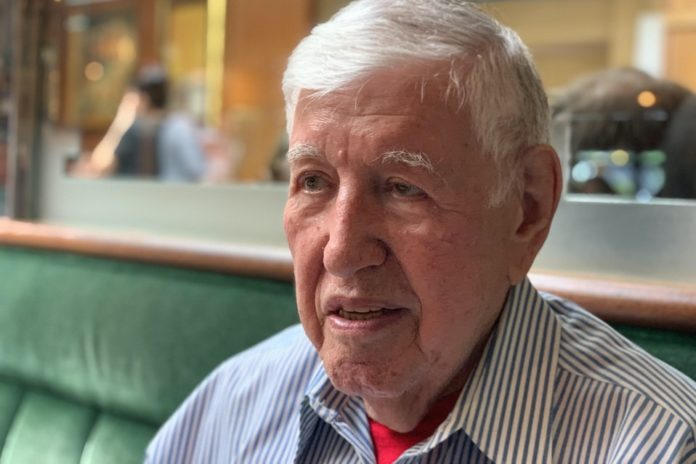“Questions the press should ask.”
That was the motto of the NiemanWatchdog.org website that Barry Sussman and I ran from 2004 to 2012.
Barry died on June 1 at the age of 87. He was a giant of journalism, one of the all-time great editors, the unsung hero of the Washington Post’s Watergate coverage. And unlike so many others, he never lost his passion for holding the powerful accountable.
“The premise of watchdog journalism is that the press is a surrogate for the public,” Barry wrote in the website’s About page. Over eight years, more than 350 experts in their field offered guidance on the website “to help the press ask penetrating questions, critical questions, questions that matter.“
Barry explained: “Great journalism comes mostly to reporters and editors who ask the right questions, who have a full understanding of what they are looking for and who can recognize what rings true and what doesn’t.”
Working with him was an honor. The regular lunches with him and two other Washington Post legends — Murrey Marder and Morton Mintz – were inspirational. Murrey’s fearless reporting helped bring Senator Joseph McCarthy down and exposed the deceit and hypocrisy of the Vietnam War. His bequest of Washington Post stock to Harvard funded the Nieman Foundation’s Watchdog Project. Mort, who pioneered investigative reporting in medicine and public health, was a senior advisor.
As for Barry, well, without him there probably would have been no Watergate. As David Halberstam wrote in “The Powers that Be”: “Before anyone else at the Post, Sussman saw Watergate as a larger story, saw that the individual events were part of a larger pattern, the result of hidden decisions from somewhere in the top of government which sent smaller men to run dirty errands.”
Halberstam continued: “From the start, the Post was thus unusually lucky. It had the perfect working editor at exactly the right level. Sussman was not simply encouraging, he brainstormed the story, trying to put the pieces together, fitting them and refitting them until finally, slowly, there was the beginning of a pattern. More, he believed in the story, he was sure there was something there.”
Barry went on to edit, champion, and call for more watchdog reporting. But too often, he found himself decrying its paucity. “There is too much forfeiting when it comes to seeking out important news,” he wrote in his final column for Nieman Watchdog in 2012, calling out credulous coverage in the run-up to the war in Iraq, and lack of coverage on the ground in Afghanistan and Iraq.
His diagnosis of the media was grim – and, sadly, still pertinent:
As a group, the traditional U.S. press has badly failed at reporting dissent in America – there’s abundant newsworthy protest but you can seldom tell it from the news media – and has failed at reporting on poverty, failed at follow-up reporting on the Bush administration torture policies and other actions, and failed to sufficiently report the Obama administration’s high-handed refusal to deal with those issues. Instead of ridiculing the obstructionist Republican party leadership in Washington and the states, as it should, the mainstream press treats them as if they have goals other than serving large corporations and the rich and suppressing the vote. Not to defend Democrats, but if the press did decent, steady reporting on politics, made fun of GOP fantasies, and if the Democrats behaved, as Paul Wellstone once put it, more like the “Democratic wing of the Democratic party,” then it would be hard to imagine more than a few Republicans winning national office. The press ignores climate change, a world crisis, for weeks at a time. Corporate influence on America and the remnants of a labor movement are seldom reported on at all.
He was always wise, and often prescient. In a 2004 column, he decried the credulous stenography of the New York Times’s campaign reporting – which is no better today. In a 2008 column, he decried the New York Times for publishing an explosive story then letting it die – an ongoing problem. In a 2011 column, he called for reporters and pollsters to track the effects of Fox News’s bias on its impressionable viewers, a topic that remains insufficiently explored.
In the classic Watergate movie, “All the President’s Men,” Barry’s seminal role in the Watergate story was meted out to other characters to make the story tidier. Barry criticized the hype about “Deep Throat,” a minor figure whose mythologizing he felt distracted from the relentless reporting work he oversaw. His detail-filled 1974 book “The Great Cover-Up” was considered by many to be the most authoritative retelling of the Watergate story. It was Woodward and Bernstein who became celebrities, but it was Barry who put them on the story and guided them every step of the way.
Just two weeks before the 50th anniversary of Watergate, its editor has passed. Rest in Peace.

I remember Murray Marder’s and Morton Mintz’s bylines very well. I remember also the hope I felt at the time they were active (I.F. Stone motivated that hope as well) that journalism could hold itself accountable to, and truly serve, the public, instead of (as currently seems the case) being accountable to, and in competition with, the meme-meisters who distort and dominate so much news coverage now. I’d be curious to know which, if any, line reporters you think are following in the footsteps of the greats? As always, deep thanks for your work.
Kudos all ’round, but let’s at least give some consideration of Frank Wills as the “unsung hero” of Watergate.